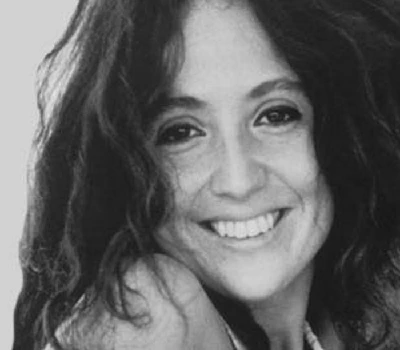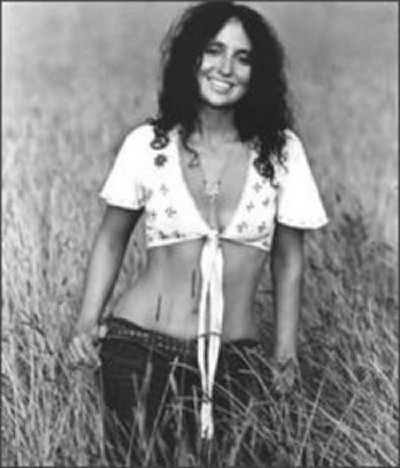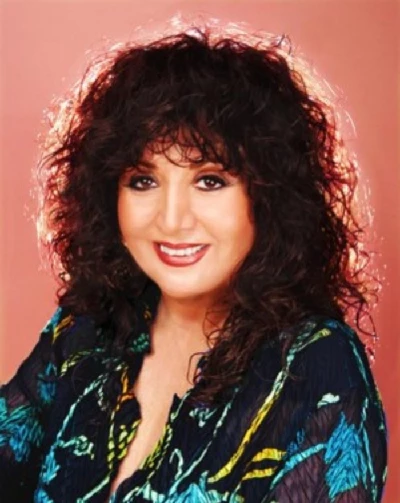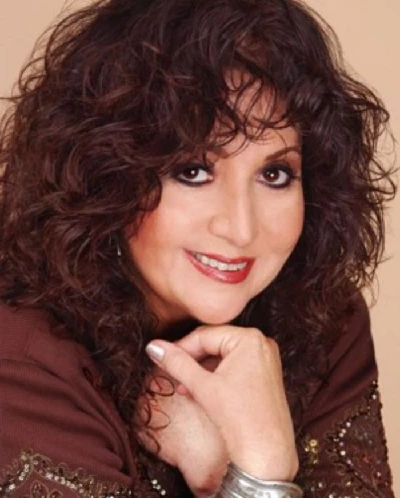published: 1 /
12 /
2009
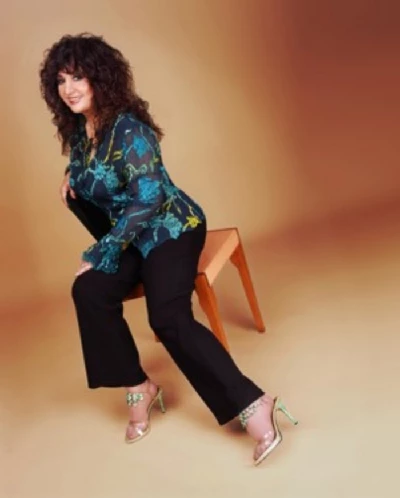
...while in the second part she talks to her about 'Midnight at the Oasis', the song which first brought her to public acclaim
Article
PB: Why did you select the song, 'Midnight at the Oasis', for your first solo album? Did this song receive the response that you expected?
MM: In a nutshell, my husband and I broke up in 1972 and I had, up until that time, had not been a solo performer, I had been part of the Even Dozen, or the Jim Kweskin Jug Band or part of the Geoff and Maria Muldaur duo. In all cases, I was not the master mind of the band. I was used to just being a band member. They were all kind of democratic organizations. I was just a participating member of a larger musical entity and so it was very daunting and overwhelming for me - and challenging to say the very least - to find myself a solo performer with the huge challenge and responsibility of making my own first solo album.
During this time of adjustment I also was totally heartbroken about the break-up. Now I was a young, single mom, trying to figure out how to make a living for me and my daughter.
PB: How old was your daughter at that time?
MM: My daughter was about seven, I believe. Around that time, my biggest vision about what I could do to support myself was to become a waitress in one of Albert Grossman’s restaurants in Woodstock, New York. Albert Grossman was a big manager. He managed Janis Joplin. and me and Geoffrey, the Kweskin Jug Band, The Band, Bob Dylan, Peter, Paul and Mary, etc., etc., Todd Rundgren. He was a major force back then, and he owned a couple of restaurants in Woodstock.
So I asked him for a job as a waitress, which I ended up not actually ever having to do because in the meantime I had run into Mo Osten, the president of Warner Brothers Records, totally by coincidence. He offered me the opportunity to do a solo album! Here I was, not knowing how to begin to pull it all together. I had been working a little bit with a young guitar player named David Nichtern who played great guitar and wrote really lovely, contemporary songs and he had his own little, singer-songwriter career going in the Village and other folk joints around the East Coast.
I met David through a friend of mine named Artie Traum, and he was having me sing some back-up for him on some demos – some small chump-change level of career activity. But, he was making a living at it. So he was very, very supportive of me and encouraging and he said "People still remember you from the jug band (it had only been five years before) and you’re more well-known than I am", he said, "And you could get some gigs."
He started booking me little gigs in little coffee houses and he would back me up – I played a little guitar myself and Freebo, Bonnie Raitt’s bass player at the time, would come, when he wasn’t working with Bonnie, and moonlight with David and I. He’d drive down on his own dime and we’d do a gig and maybe we’d each make fifty dollars. While David would be driving to the gig, I’d be hanging my head out the window crying because I was all torn up about the break-up, and he would patiently listen to my tales of woe and then he’d say, “We’re almost there now and when we get there, go wash your face and dry your eyes. We’re on in half an hour!”
So he was like a supportive little brother who, every time I started to look like I was going to fall over, would just gently prop me back up on my own two feet. So, when I got the chance to do the solo album, I was brought out to California and they gave me a bungalow in Laurel Canyon for my daughter and my mother’s helper to live. I had to have someone help me with Jenny.
And when we started the recording, I found myself in the studio with all the top guns of the recording world at that time. Dr. John, Ry Cooder, David Lyndley, Jim Keltner, all the greats. So I was in pretty high company there, but I was planning to record one of David’s songs, a lovely ballad called, ‘I Never Did Sing You a Love Song.’
So David got this little VW bug and drove all the across the country in February in the worst weather with the hopes – knowing that I had these fabulous guitar players lined up to be on the album – that he might, just maybe, get to play rhythm guitar, on the song of his that I was going to record. So he gets there and he was sleeping on a mattress on my living room (we were definitely doing things the low-budget hippie way back then!).
Anyway, we did his beautiful little song. He played rhythm guitar and everything was cool. But, he kept hanging around because he was just fascinated with the whole recording process. He was all eyes and ears – observing all these real deal people conducting the recording session and so forth.
This is a great story, actually. The producer Lenny Waronker, came in – we were practically finished. I think we had recorded eleven songs and he says, “I’ve been listening to the rough tracks at home and I think that we’re in pretty good shape. We’ve got some nice ballads and we have some great up-tempo songs. I think if we could just find one medium-tempo song to round out the album, I think we’d be in great shape.”
I thought to myself, David has a song. It’s kind of a funny little song, but it’s the right tempo. So I said, “David, why don’t you play ‘Midnight at the Oasis’ for him,” because I had heard him do it at a few gigs. I wasn’t wild about the song, but it did fulfill the qualifications of being medium- tempo, so David whipped out his guitar and started to play it and I sang it. The producer cocks his head to the side and I could tell he wasn’t wild about it either, but he says, “That’s cute, do you want to do that? Let’s do that.”
I did this strictly as a gesture of gratitude to David for being so supportive - not just in the beginning - but when he was out there staying with me, he would say, “You can do this.” He just gave me a lot of positive feedback and encouragement.
We called up Freebo - he comes into the studio, because he knew the song, and we got a great drummer, Jim Gordon, and went in and cut it. So, recording 'Midnight at the Oasis' was just an after-thought, and the whole point was really about giving gratitude to David. BUT, God rewarded me for that gesture! The album was released and everyone thought it was very unique, very eclectic.
The songs were unique, the playing and musicality of it all was wonderful, and so for the first couple of months it was getting great reviews. I was suddenly getting a lot of gigs. 'Rolling Stone' wanted to interview me. I was blown away just by that level of response. My biggest expectation when I embarked on the project, would be that I would be out in California for a few months, escaping the worst, bitter cold part of the winter (which is never a good time to be in Woodstock – you can get snowed in there for days!) and I just thought I’d make a little money, I’d make the recording session money, union scale, making the album and I’d try to support myself and Jenny for a few months.
Anyway, something quite different happened. First of all, the album really took off. It started climbing up the billboard charts. Back in those days, they didn’t demand that you have a hit single. There were other artists on Warner Reprise like Randy Newman, Ry Cooder. They made albums that were like pieces of art, and they came out as a whole and having a single was not a particular thing to be expected. But after a couple of months of it just climbing the charts on it’s own. DJs just started playing cuts, and all of a sudden there was a huge request for ‘Midnight at the Oasis’. I had never thought they’d make it a single. It climbed to the top of the charts and was on the charts for months and months. It became a gold record, eventually platinum. It was nominated for a Grammy in several categories.
It put me on the map, not just in this country, but around the world. Although I’ve stayed an active prolific artist developing my musical journey all the time, just on the basis of that one song I can still play Japan, New Zealand, Europe, Australia - all over the place! So, that’s an interesting little story. God was really blessing me in those days!
People say, “Are you tired of having to sing your hits?” and the answer is no, because luckily for me that song was a very hiply constructed song. A lot of jazz artists and even instrumentalists have recorded it because it has really hip, jazzy changes. You can play a song like this, night after night after night. It’s always interesting to me. Thank God, it wasn’t ‘Wild Thing’ - that I might find hard to sing after 35 years! But, this is a really well-constructed jazz tune that my band can find all different ways to improvise on night after night.....So that’s the story of ‘Midnight at the Oasis’ and I’m stickin’ to it!
PB: How did you come across singer-songwriter Wendy Waldman? On your debut, self-titled album, you recorded two of her originals, ‘Mad, Mad Me’ and ‘Vaudeville Man.’
MM: When Geoffrey and I first came out to California we were doing some gigs with a jug band and we stayed at this guy Ken Waldman’s house. She was his young girlfriend at the time. Several years later, when I came out to California to do my first solo album, Wendy Waldman had already made an album and when I got there I reconnected with her. She’s a fabulous songwriter and singer, producer and harmony singer. It was a natural!
PB: ‘Mad, Mad Me’ is such a heart-breaking, gorgeous song. Did you just fall in love with it the first time you heard it?
MM: I was in a state of utter pain and emotional pain and angst because of the break-up (which was not a pretty break-up!) and so the song really resonated with me. I immediately wanted to do it. The funny thing is – we did it as demo in Woodstock (for Warner Brothers Records - they wanted to hear what I had in my mind to do). And it ended up on the record, just the way it was done on the demo. We didn’t re-record it. The amazing thing is, I don’t do it very often, but it’s one of my most requested songs.
It’s a very poignant song and it probably speaks to a lot of people. I wouldn’t do anything that painful now! I try to keep on the up and on the breezy side of things, but it’s interesting you mention that song because it’s a favourite of a lot of people.
PB: Maria, you’ve been really generous providing a lot of songwriters with opportunities to hear their songs realized and you’re also well-known for the diversity of your albums. Besides recording tribute albums to Peggy Lee and child-star Shirley Temple, you also recorded a tribute album of the more romantic Bob Dylan songs.
Did people give you a hard time about emulating Dylan’s songs? Your vocal quality is so different and you’re a female performer.
MM: Are you kidding me? Emulating Dylan? I’ve never tried to emulate Dylan in my life! But, I’m always seeking out the best songwriters that exist in every genre. Whether I’m doing a Jug band or R&B album, or whatever it is, I make it my business as a non-songwriter to find the best songwriters that exist in each genre. And Dylan to me is the best songwriter in every genre I’ve done over the years. Are you talking about 'Heart of Mine', the album of Dylan love songs I did?
PB: Yes.
MM: Well, I keep files of all my reviews – and, by the way, in my life, I rarely, rarely get anything other than a really good review and I’ve got to say people like what I do. It doesn’t always transfer into commercial success, but I have good critical success. So I gotta tell you. ‘Heart of Mine – The Love Songs of Bob Dylan’ (got me) the largest file of the highest degree of praise for that album from critics everywhere. Dylan himself told me that he loves the album. Many people said that they never enjoyed those songs more than when they heard me sing them!
So, to answer your question, did I get any flack for it? No, I got high praise!
PB: ‘Baby, Please Don’t Go’ represented another period of your life while working with the Paul Butterfield Blues Band. What was going on with your career at that time?
MM: The poignancy of that recording is that my husband had just left me to become part of that macho, testosterone-driven, drinkin’, drug takin’, rootin- tootin’ macho blues band. But, I loved them! I loved Paul always because he encouraged me to find my blues voice which isn’t my “pretty” voice. Back then I had this light, lilting, pretty little voice and Geoffrey wasn’t too keen on the idea of me trying to sing the blues.
He would tell me a little condescendingly that I should stick to the pretty stuff. But, Paul, who didn’t have that much of a voice himself, said, “It doesn’t matter how it sounds coming out. Just open your mouth and sing and express yourself that way.” I had a great rapport with Paul and the band that they formed was killer and I was just thrilled that Paul had come and asked me to play some blues fiddle on it.
So, I recorded ‘Baby, Please Don’t Go’ with them – and of course, I was singing with the greatest and most earnest sincerity in that moment of time. I used to go out and jam with those guys all the time.
PB: Was their pressure - politically or morally – you said you produced your own albums which was not always the case with female artists – on you as a woman, particularly in the 70s? Did you feel you were taken seriously in what then was considered to be a primarily male-governed industry?
MM: You know, I’ve been asked that question in various forms hundreds of time. Starting with the 70s, the heyday of women’s lib. But, I never encountered any problems – I was always accepted by what was virtually an all male cast of characters in the music business.
I was not a groupie, I didn’t have to sleep with anyone to get anywhere. I just recently was with my old friend Taj Mahal and we were talking about some early album of mine, and I said, “I can’t stand to hear how I sounded then,” because I’ve really progressed as a singer since then. He shushed me and said, “Maria, you got more chops over the years and you know more what you’re doing now. But, make no mistake. We all knew you had it then, baby. We knew you had it the minute we heard you! You had it then and you got it now!
In other words, I wasn’t an overly ambitious person. My musical life began when I wandered into this wonderful room with all these treasures – American Roots Music! Blues, Appalachian, blue-grass – I explored played them all!
And then I just started singing with people and forming little duets - just followed where it led me. And I was not at all denigrated by men and they invited me they invited me to be part of what they were doing, not because I was some sexy figure, but because they had respect for me and my musical talents!
PB: You considered early female blues artists such as Victoria Spivey and Memphis Minnie inspirational characters. How would you like to be remembered - given your penchant for musical diversity and breadth of experience - and how would these gusty blues women play into that legacy?
MM: Victoria Spivey took me under her wing and encouraged me when I was a young ingénue. I barely knew how to sing at all. Really, she recognized what I had and she really took me under her wing and encouraged me and supported me so strongly.
Memphis Minnie, although I never knew her, was a great role-model because her songs were all about feminine self-reliance. There were no “poor, pitiful” me songs among the 200 songs she wrote and recorded.
When I recently I hooked up with the younger, “new Jug generation” they started referring to me as "our very own Mother Jugs." I’d like to be remembered as somebody who loved our rich heritage of American Roots Music and brought it forward to subsequent generations to cherish and learn from, and certainly learn to enjoy playing it. It is one of the most important aspects of our American culture and it’s often forgotten in this day and age.
But, it’s really heartening to see that a whole younger generation is picking up on it and becoming very skilled at playing it authentically and with great joy, and that’s what I want to be known for, too, as someone who sings skillfully and authentically about real issues that concern the human heart and soul and move people in a meaningful way.
PB: Thank you so much, Maria.
MM: Thank you, too.
Picture Gallery:-
